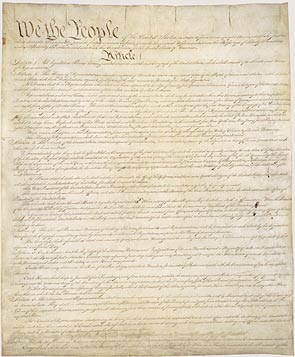|
.........
Title Here
EDITORIAL - Is bigger better?
~~~~~~~~~~~~~~~~~~~~~~~~~~~~~~~~~~~~~~~~~~~~~~~~~~~~~~~~~~~~~~~~~~~~~~~~~~~~~~~~~~~~~
 |

Constitution does
not specify the
exact number of
members in
the House of
Representatives |
|
A bigger House of Representatives?
Proponents of a bigger legislature argue that the 435-member House is both
a violation of the Constitution and is undersized.
EDITORIAL
Los Angeles Times
July 20, 2010
It seems counterintuitive. At a time of sagging approval ratings for Congress, the Supreme Court is being asked to rule that the House of Representatives is too small. It's for Congress, not the courts, to decide how many members the House should have, but there are some appealing arguments for the idea of a larger chamber.
A federal court in Mississippi recently rejected a claim by voters in five states that the current allotment of 435 representatives violates the Constitution's requirement that states be represented in the House "according to their respective numbers." That decision is being appealed to the high court.
The plaintiffs' argument is that some states have more representation than others because of variations in the populations of congressional districts. For example, Wyoming has a single district with a population of 495,304, while Montana's one district comprises 905,316. It isn't just single-district states that are over- or underrepresented. West Virginia's three districts average 604,359, while the average for Mississippi's four districts is 713,232. |
| |
Disparities result partly from the fact that every state is entitled to at least one representative, and that some states fall short of the population threshold for an additional seat. But the plaintiffs argued that disproportions would decrease as the size of the House increased. Ruling that "mathematics do not control," the three-judge panel in Mississippi correctly held that the plaintiffs "seek judicial entry into the exact area of decision-making that was reserved for Congress."
But that raises the question of whether Congress itself should increase the size of the House, not only to minimize disparities but to take at least some account of the population explosion that has occurred since 1911. That was the year Congress provided for 435 seats once Arizona and New Mexico were admitted to the Union. (The number rose temporarily to 437 in 1959 when Alaska and Hawaii became states.)
The number 435 isn't written in stone, let alone in the Constitution. What are the arguments for increasing it — say to 650, the size of the British House of Commons? In addition to reducing disparities, a larger House could make representatives more responsive because their constituencies would be smaller. (For the same reason, The Times in the 1990s endorsed a proposal for a larger Los Angeles City Council.) Campaigns would be less costly because fewer voters would have to be canvassed. And parties and points of view that are perennially locked out of office by the size of current districts would see their prospects improve.
We're under no illusion that expanding the size of the House would be politically easy. For many voters — and thus for many members of Congress — "big government" is anathema. More representatives, even if they were paid less, would be portrayed as a raid on the Treasury. But it's time to begin the debate about whether, when it comes to representation, bigger is better. |
|
|
 |

|